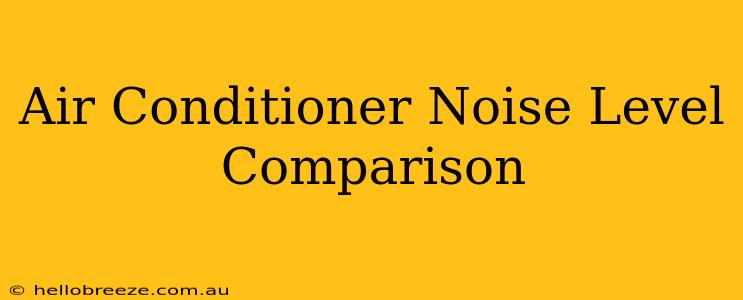Choosing an air conditioner can feel overwhelming. Beyond cooling power and energy efficiency, noise levels are a major factor influencing your comfort and enjoyment of your home. A noisy AC unit can be incredibly disruptive, affecting sleep, concentration, and overall peace of mind. This guide will help you understand air conditioner noise levels and how to choose the quietest option for your needs.
Understanding Air Conditioner Noise Levels
Air conditioner noise is measured in decibels (dB). A lower dB rating indicates a quieter unit. To put this in perspective:
- 30 dB: A whisper
- 40 dB: A quiet library
- 50 dB: Normal conversation
- 60 dB: Normal traffic
Most air conditioners range from 45 dB to 65 dB. However, some models, especially those with inverter technology, can achieve significantly lower noise levels.
Factors Affecting Air Conditioner Noise:
Several factors contribute to the overall noise produced by an air conditioner:
- Type of AC unit: Window units tend to be noisier than split systems (which have an outdoor and indoor unit). Portable AC units fall somewhere in between.
- Size and power: Larger, more powerful units generally produce more noise.
- Compressor type: Inverter compressors are known for their quiet operation compared to traditional on/off compressors. Inverter compressors run continuously, adjusting their speed to maintain the desired temperature, resulting in quieter and more efficient operation.
- Fan speed: Higher fan speeds generate more noise.
- Installation: Poor installation can lead to increased noise and vibration.
Comparing Noise Levels Across Different AC Types
Here's a general comparison of noise levels for different types of air conditioners:
Window Air Conditioners:
Generally, window units are the noisiest option, often ranging from 50 dB to 65 dB. Their compact design often means less room for sound-dampening materials.
Portable Air Conditioners:
Portable AC units tend to be slightly quieter than window units, typically falling within the 45 dB to 60 dB range. The inclusion of some sound-dampening materials usually contributes to a quieter operation.
Split System Air Conditioners:
Split system air conditioners are often the quietest option, with many models boasting noise levels as low as 40 dB or even less. The separation of the compressor unit (located outside) from the indoor unit significantly reduces the noise inside your home.
Ductless Mini-Split Systems:
These systems also benefit from the separation of the indoor and outdoor units. Many high-end models are designed with noise reduction in mind, achieving impressively low noise levels.
Tips for Choosing a Quiet Air Conditioner:
- Check the dB rating: Look for the decibel (dB) rating on the product specifications. The lower the number, the quieter the unit.
- Consider inverter technology: Inverter compressors are significantly quieter than traditional compressors.
- Read reviews: See what other customers have to say about the noise level of the unit you're considering. Many reviews specifically mention noise levels.
- Pay attention to fan speed: Choose a unit with multiple fan speed settings, allowing you to adjust the noise level to your preference.
- Proper installation: Ensure your AC unit is professionally installed to minimize noise and vibration.
Conclusion: Silence is Golden (and Cool!)
Choosing a quiet air conditioner is crucial for comfort and peace of mind. By understanding the factors that influence noise levels and using the tips provided, you can find the perfect balance of cooling power and quiet operation for your home. Remember to always check the dB rating, read reviews, and consider professional installation for optimal results. Invest in a quiet AC unit and enjoy the cool, comfortable, and peaceful atmosphere it provides.

